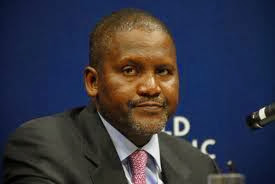In a keynote address during the just ended Nigeria’s 53rd Independence Anniversary Lecture, organised by the Lagos Chamber of Commerce and Industry, LCCI, Dangote said the Nigerian financial sector has demonstrated its ability to support big ticket industrial projects – the most recent being the US$9 billion refinery project by Dangote Group and is poised to invest $US 34.7 billion by 2017.
“Private sector participation is growing in areas such as fertilisers, petrochemicals, etc. Indigenous entrepreneurs now dominate some sectors that were at inception controlled by foreign firms, federal and state government, namely, financial services, cement, petroleum marketing; the upstream oil & gas sector,” he said.
He added: “Agriculture continued as the lifeblood of the economy (accounting for 65 percent of GDP and 70 percent of exports).
“Cocoa, cotton, groundnuts, oil palm products, and rubber were the principal export crops in the 1960s (and early 1970s). Agriculture largely provided the foreign exchange that was utilised in importing raw materials, capital & consumer goods; as well as funding basic infrastructure needs. Food security was achieved – not just because peasant farmers were able to produced enough to feed the entire population (but also because Nigerians had not yet developed the palate to consume what they did not produce.”
Dangote said in setting an agenda for the next decade, government should improve the business climate and continuously benchmark our business environment against “best-in-class” investment destinations, implement the recently unveiled Nigeria Industrial Revolution Plan, support the new investors in the power sector to ensure they “hit the ground running” and provide the kind of outcomes Nigerians desire.
According to him, their investment in agriculture is driven by our desire to create jobs for thousands of Nigerians and that it will increase their workforce from its present level of 26,000 employees to 750,000 employees.
Meanwhile, Dangote has been appointed as the co-chair of next year’s annual World Economic Forum (WEF) summit taking place in Davos where political and business leaders congregate to fund solutions to global socio-economic problems.
The 56-year-old will chair the Switzerland summit along with Professor Klaus Schwab, the WEF executive chairman and founder.
Appointing Alhaji Dangote, Professor Schwab said: “The discussions aim to stimulate an unparalleled global dialogue among the relevant leaders from the government, business, academia, civil society and the media. In these unprecedented times, I feel that as co-chair, you will contribute significantly to the substance and relevance of the exchanges.
“You are well positioned to take on this role. Co-chair would in principle consist of your presence and participation in activities to be defined with you.”
Themed The reshaping of the world: Consequences for society, politics and business, next year’s summit is scheduled to hold between January 22 and 25. Professor Schwab said the WEF was of the belief that Dangote’s participation would contribute significantly to the substance of the discussions.
ADVERT





No comments:
Post a Comment
WE LOVE COMMENT!!!
Your comment is important to us.
Thanks